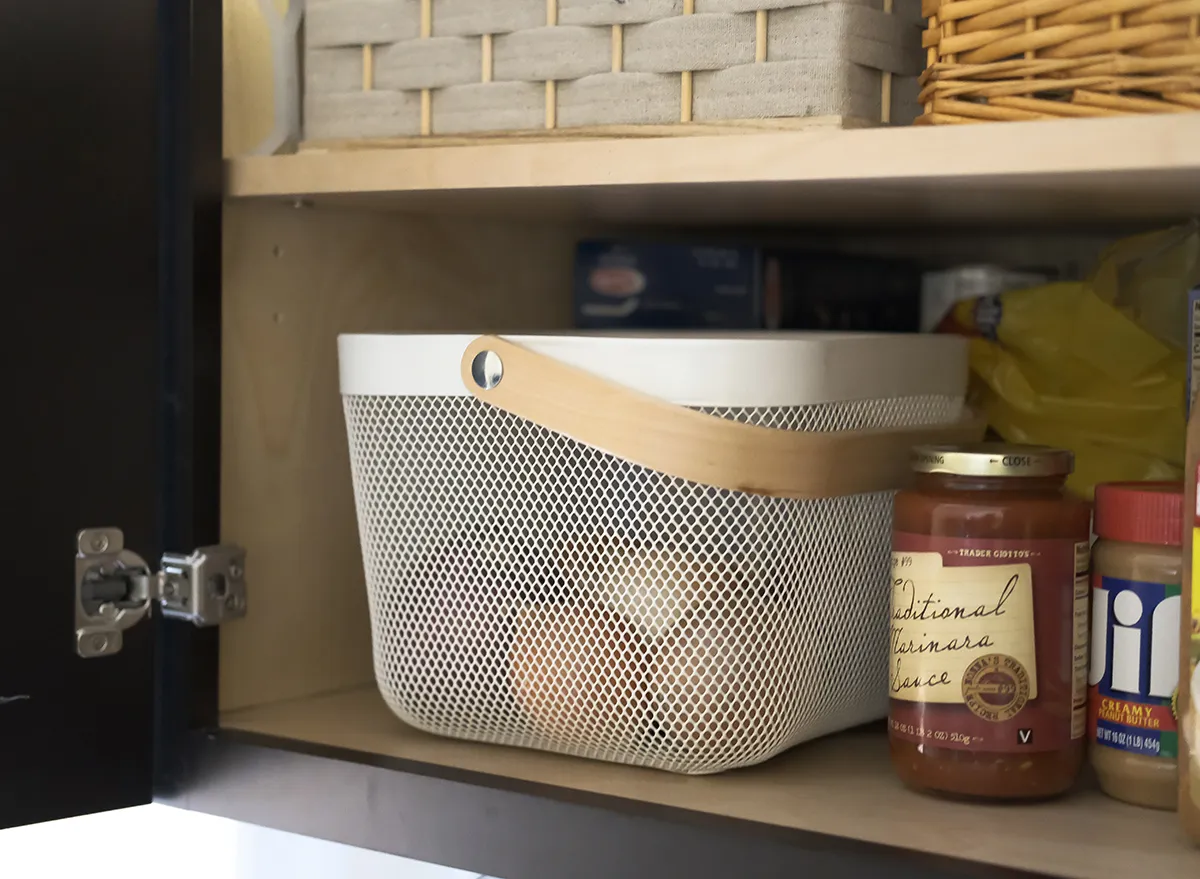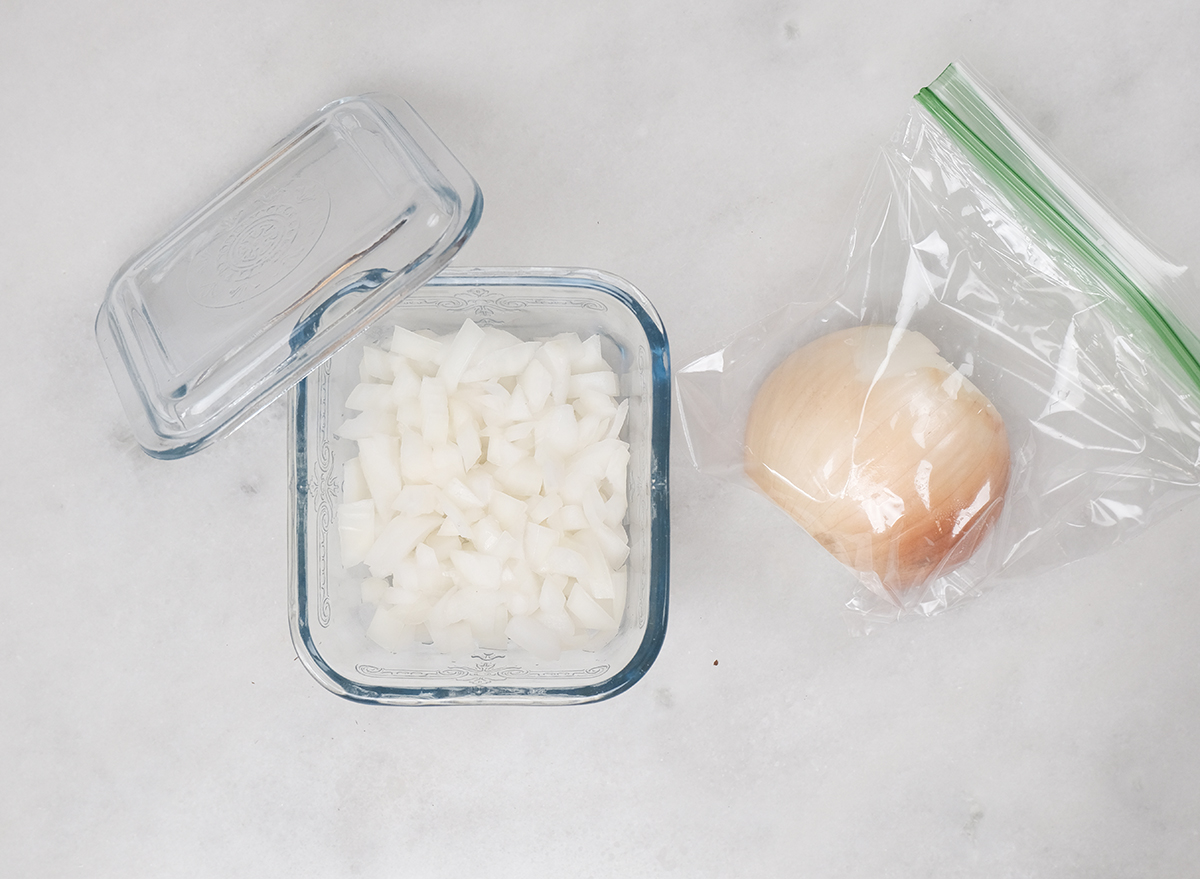How to Make Peeled Onions Crunchy Again
Onions: either y'all love them or yous hate them. The root vegetable, which comes in all different shapes, colors, and sizes, may have a peculiar taste and make you cry when yous cut into them, but onions are oftentimes a leading ingredient in the kitchen. Think about it: they're key in salads, vegetable stir fry, and onion rings, to proper name a few. So it'southward important to know how to shop onions properly to avoid spoilage.
That said, nosotros checked in with the National Onion Clan and Dr. Gitanjali Kundu, assistant professor of biological science at Brookdale Customs College in Lincroft, New Jersey, for the all-time onion storing practices—especially because the ingredient is ofttimes purchased in majority.
Here's everything nosotros learned about how to store onions—both uncut and cut—the right way.
Find a dark, absurd, well-ventilated place to store uncut onions.

Torn on what to do with that big pocketbook of onions when you lot render from the grocery store? Skip the refrigerator. René Hardwick, Director of Public and Industry Relations for the National Onion Association, suggests keeping all bulb onions in a "nighttime, cool place: such as a pantry, basement, or garage, which can give the onions a shelf life of upward to four weeks.
Dr. Kundu also points out that a dry, well-ventilated place is very important because "the mold, which is a fungi, cannot grow in dry out environments because they demand moisture for growth." The event? Slowed-down spoilage. In fact, according to ane 2016 study, it's ideal to store uncut onions at a temperature of 40-50°F.
It's likewise imperative to shop the uncut onions in a mesh purse or open basket rather than a plastic handbag because plastic numberless don't have the proper ventilation to aid the onions last longer.
But what happens if yous store the uncut onions in the refrigerator rather than in a dry, ventilated surface area? Considering the fridge has lilliputian ventilation, the cold, humid weather "triggers the growth of mold, so they will get spoiled faster," Dr. Kundu notes.
Have you ever noticed your refrigerated onions condign sappy, soggy, and soft sooner than you'd like? That's because the plants store carbohydrates equally circuitous sugar chosen starch, and when they're stored in a cool temperature, those complex starches get converted into simple saccharide molecules. Dr. Kundu says: "Microorganisms, [such as mold], love sugar because sugar gives them the energy to grow."
In one case you cut an onion, it's crucial to store whatsoever leftovers in the refrigerator.

When buying onions in bulk, it's oftentimes difficult to utilize them all at once. While there are means to get creative with leftover onions (caramelize them or toss them with peppers and onions, for example), we often get in the habit of storing one-half an onion or diced/sliced onions for afterward use. But what'due south the best storage do to avoid spoilage of cutting onions? Store them in the fridge.
RELATED: Easy, healthy, 350-calorie recipe ideas you tin make at home.
According to the USDA, whole peeled onions accept a shelf life of 10-14 days refrigerated, while diced and sliced onions typically last 7-10 days refrigerated. It'due south recommended to store cutting onions in a sealed container or plastic bag while in the refrigerator.
So why do we choose the refrigerator over a cool, dry out identify? Retrieve those rumors that you should never eat an onion out of the fridge because of bacteria? Not true. According to a 2017 McGill article, "bacteria are not spontaneously generated. They take to exist somehow present to first with. Cut boards and dirty easily are a possible source, but food spoilage bacteria practice not become airborne; yous need contact." Basically, this means that your onions are safety to be stored and eaten at a later date, as long as you lot didn't cut them on a cutting board that could be contaminated and you made sure your easily were clean while you lot were treatment them.
Dr. Kundu explains, "Information technology's like when y'all have a cut, you can innovate germs, and that compromised area can go infected more quickly….that has happened to the onion now."
Fifty-fifty though there are microorganisms within the refrigerator, most of them can't multiply that apace due to depression metabolism at a temperature of 4°C . This leads to slowed down onion spoilage, she adds. "But if you had kept the uncut onion in room temperature, it is a good place for fungi to grow."
Cooked onions should be stored in the fridge as well.
"Sometimes cooked onions not stored properly can allow the growth of toxin-producing bacteria like enterohemorrhagic Escherichia coli, Clostridium botulinum, etc.," Dr. Kundu says.
So, why in cooked onion, merely not in raw?
"Because in raw onion, the active ingredients are there. So when yous melt the onions, many antimicrobial compounds (including sulfuric acid) are macerated. Therefore yous find more of a bacterial growth taking over."
"Several toxin-producing leaner can take resistant forms called endospores. Getting rid of the endospores is a claiming to the food industry because these structures are very resistant to estrus and cooking," Dr. Kundu adds. "And then what it means is yous have cooked the food thinking you've killed the bacteria, just endospores can withal be present. They behave like a dead bacteria, and upon entering the homo body become live again and may farther cause pathogenesis."
That said, store cooked onions for up to five days in a sealed container in the refrigerator.
Here's how to know if your onions accept spoiled.
If you do good onion-storing habits, you'll accept a amend grip on knowing when your onions take spoiled. Simply in that location are a few things to look out for to help you decide whether or non you should toss the vegetable.
"Modify in the color is the biggest show of how you can tell an onion has gone bad," Dr. Kundu says. "[Look out for] gray spots, brown spots, black spots, and those velvet-like, fuzzy, cottony growths."
It helps that you are able to see the spoilage of the onions. "Molds are amend at growing on onions rather than bacteria, because the molds like to grow in acidic pH. Nosotros call fungi acidophiles, which means acid-loving microorganisms."
"Sometimes, [the] presence of slime is also a sign depicting microorganisms have fed on the cells and sugar of the onion," she adds.
Our best communication? If you notice any mold on your onion, but send information technology right to the garbage.
In that location could be health risks associated with eating contaminated onions.
Back in 2012, there was an instance where contaminated onions were recalled. "At that place accept been cases where people thought there was contamination of Listeria monocytogenes that could grow in refrigerator temperature," Dr. Kundu notes. "Listeria monocytogenes causes a fatal disease called listeriosis, which affects the immunocompromised population, which is people who accept weak immune systems, such as pregnant women, infants, elderly people, people who have AIDS, or people who take undergone chemotherapy. Information technology can be fatal to them."
According to Up to Date, Cladosporium, Alternaria, Epicoccum, Fusarium, Penicillium, and Aspergillus are common genera of fungi that tin be found indoors. "Fungi exposure can indeed cause adverse health furnishings, including infections, hypersensitivity disorders, and toxic/irritant effects from their by-products," the article reads. According to i written report, toxins can also exist associated with allergic incidents.
"Ingested in higher amounts, these fungi could be involved in toxin associated illnesses," Dr. Kundu additionally notes. "Some dangerous toxins produced by several species of fungi are mycotoxins, aflatoxin, fumonisin, ochratoxin, etc."
It's also important to note that last twelvemonth, NOA confirmed onions cannot help cure the influenza (yep, people really believed this!) and are not responsible for food poisoning. Phew!
Source: https://www.eatthis.com/how-to-store-onions/
Belum ada Komentar untuk "How to Make Peeled Onions Crunchy Again"
Posting Komentar